Text
3 notes
·
View notes
Text
[Book Rec + Reaction/Thoughts] The Lantern and the Night Moths 灯与夜蛾 by Yilin Wang
An anthology of translated poems by five modern or contemporary poets and accompanying essays by the translator, @yilinwriter.
You can find the pronunciation guide and list of corrections here!
The cover art, a beautiful expression of the tone of this collection, is by Taiwanese artist Ciaoyin (check out her gorgeous insta!). I'm looking forward to the arrival of the physical book as my tab absolutely does not do it justice xD

Anyway! The official release date is 02 April 2024 though there have been some very thoughtful reviews by early readers already. Here, here, here and here.
(It was an ARC that I received too… though in the time it took to put this together, the ebooks have already gone out to readers >.< typical snail yj!)
Instead, I’ll tell you who I think would be interested in this book or might benefit from reading it, then share things that are cool about it from the perspective of a bilingual hobbyist translator + lover of ancient poetry and lyrics.
Who should read it?
If annotations, translator’s notes and reflections spark joy for you...
If you’ve ever read poetry translations and been intensely curious about what goes on under the hood...
If you’re a translator yourself wanting to hear another voice...
Definitely check this out!
Also if you’re CN+EN bilingual and have ever read something in English that references Chinese terms and concepts etc. except ONLY in English, pinyin or wade-giles and been utterly frustrated by the ensuing guessing game (like me) Fear Not.
That will not be a problem here.
I really appreciate how Chinese words are used naturally where needed for concepts and quotes - they are also translated for those who can't read Chinese so no one is left out. It made this book of and about translation (and more) super comfortable to read! The solution is so simple, so direct, so rarely used that I am amused.
Oh, but do note that the Chinese characters are in simplified though!
The poems are organised by their writers who are listed here by order of birth year, not appearance in the book:
��瑾 (Qiu Jin, 1875 to 1907)
废名 (Fei Ming. 1901 to 1967)
戴望舒 (Dai Wangshu, 1905 to 1950)
小西 (Xiao Xi, 1974 to _)
张巧慧 (Zhang Qiaohui, 1978 to _)
Altogether, that covers nearly the last 150 years up to now. I’ve never really been into poetry by poets in such relatively recent times, in part because I’d been holding on to this stereotype of them spurning Classical Chinese and ancient poetry in the first half of the 20th century (not entirely true, as I came to realise xD). It made sense and was understandable, but felt sad.
Yet am I the target audience for this book?
Very much so.
In ways I didn’t think I would be too! It was so much fun to experience this both as a reader and a translator that I thought I’d share it here, where we are appreciating Chinese poetry together.
If you didn’t think you’d enjoy modern Chinese poetry, hey, give it a chance!
Oh yeah - on the way home a while back, I was talking to a friend about translation and was surprised to hear that her impression was that it ought to be a straightforward process. Like isn’t it a 1:1 conversion? At some point, ‘what’s the difference between something google translate might return, and how you would say it?’ was asked, and oh that was a delightful question to my ears! I showed her one of my comparison sheets where an original text is laid out alongside multiple translations line-by-line, briefly explaining some common and unique choices and how the people who had translated those probably arrived at the various interpretations. She was pretty amazed to see that the answer to her question was: very different. Hey, it’s a complicated process!
But there’s only so much one can explain in the space of a train ride. That’s why The Lantern and the Night Moths is a book I would also rec to someone like this friend of mine - open minded and curious but never having the chance to think about or encounter the craft of translation.
Like Yilin says, ‘the meaning of a word cannot be fully expressed in one single translation, nor through a series of translation attempts’. She then explains why with great attention to detail and some solid examples from one of the poems with word choices loaded with subtle connotations :D
What's interesting about it?
Okay, for one, Yilin shared a playlist of music that she listened to while working on this book. Here is the link to the spotify one and the one on youtube. Check them out! They sure put me in the mood to read xD (favs: 别知己, 小神仙 & 去有風的地方) Afterwards, this made so much sense like - ah! an audio moodboard.
She's also putting together these adorable mini profiles of each poet along with a cmedia and tea rec to match their vibes. Go see them on her instagram xD
Now to business...
structure
What really helped keep the reader’s focus was the way each section is organized, how the poems and accompanying essay were presented and finally the short bio of each person right at the end.
The poets are first introduced through five or six of their poems, works well suited to this purpose. Their voices, distinct through the vision, ambition and emotion of their words, are brought across by Yilin’s sensitive, thoughtful and poetic translations into English. These translations were also creative and transformative in a way that made so much sense after reading one of her reflections on the process, how she ‘must guide it with gentle hands to ensure its spirit is kept alive and intact during this transformative, and often excruciating process’. A rebirth into another language!
Personally, I’ve come to think of reading translations as looking at a work through another’s eyes. So it’s delightful when the translator’s presence is discernible, and even more so when the reader is given insight into their intention and process via commentary.
Yilin’s essays coupled with the poets’ bios at the end provide a means to go back and appreciate their works in context of their circumstance and inspirations. Similarly, to read the translations with a changed perspective.
I don’t know how much of a thing this is with translated poetry anthologies in English - can count the number I’ve read with both hands lol, and they’re all of the ancient chinese poetry variety - but I really like this design.
drawing on poets who came before them
Remember how we’re always recognizing traces of inspiration from ancient works (to them) in poetry of the various dynasties? 李商隐 Li Shangyin of Tang for example, was influenced by 楚辞 Verses of Chu and folklore and mythology such as that in 山海经 Classic of Mountains and Seas, 李白 Li Bai frequently references poets and history of the 魏晋 Wei-Jin era, and 王维 Wang Wei was clearly familiar with Buddhist scriptures which were translations themselves!
Just like the late Táng poets whom he praised for boldly deviating from the voices before them, Fei Ming used popular references and tropey shorthands ‘in contexts utterly different from the original, reimagining them anew’. Dai Wangshu, too, ‘boldly re-envisioned what modern poetry could look like by revisiting the classics’. In fact, in his very relatable ‘To Answer the Visitor with Classical Imagery’, I see Li Bai’s 春夜宴桃李园序, Qu Yuan’s 离骚 and lots of - as the title says - classical imagery, as if pulling out painting after painting to describe a feeling.
And Dai Wangshu’s faith in the translatability of poetry, that ‘poetry isn’t what is lost in translation, but rather, what survives it’ reminds me of what a friend, @xiakeponz, said that I agree with so much - because readers can ‘experience something in their own individual way through (your) shared humanity rather than language alone’.
poetic tradition and beyond
Between the lines of contemporary poets Zhang Qiaohui and Xiao Xi, I can really see the charm of plain vernacular, how it can be beautiful, incisive and clever in turns. Even as it seems to have moved further than ever from the structure and language of literary Chinese, the themes that inspired common motifs remain a part of life. Mother and divinity, homesickness, finding oneself, tributes to admirable spirits and the issues that trouble society - just in a new form and with different ways of expression.
Qiu Jin
So many FEELINGS about what Qiu Jin was doing - ‘I awaken the spirits of women, hundreds of flowers, abloom’. I would love if she could see the world now. So many things for her to rouse and fight against, but at the same time just as many to be proud of. I am so in awe of her, but now hearing her loneliness and struggle there is a soft spot in my heart for those too.
conclusion
So so so…
Qiu Jin’s admirable fire and lonely resolve. Zhang Qiaohui’s precious ability to express beauty in the mundane and in pain. Fei Ming’s utter delight! He is having so much fun and when* I’m vibing, I feel it too. Xiao Xi’s critical eye and keen observation of the world. Dai Wangshu’s whimsical charm and passion for translation. Finally, Yilin Wang, the connecting thread wound through them all, bringing them together so that we may be acquainted.
*Reading his poetry is like unwrapping a seamless, many layered present. A gift that keeps giving - if only you have a key 😅 Fortunately, Yilin has halved our struggle 🤣
I’ve had such a great time with them all. And if you come, I hope you will too!
#The Lantern and the Night Moths#chinese poetry#Yilin Wang#poetry in translation#灯与夜蛾#Qiu Jin#Zhang Qiaohui#Fei Ming#Xiao Xi#Dai Wangshu#rambly reviews#i read from Fei Ming onwards on my kobo LOL but that one has no colour so...#i might do more of these review-y rambles about poetry things if y'all are interested?#i've been reading LOL#some are chinese some are english#all of them fun and enlightening
42 notes
·
View notes
Photo

『蝋梅提灯火走蛾文様』 ロウバイの花言葉「先導」「先見」。 #切り絵アート #切り絵 #蛾 #花 #アートワーク #家紋 #和風 #黒 #インク #モノクロ #水彩画 #文様 #蝋梅 #提灯 #冬 #papercraft #paper #moth #flower #artwork #familycrest #japanesestyle #black #ink #monochrome #pattern #watercolor #wintersweet #lantern #winter https://www.instagram.com/p/CKD1Tc3MYkh/?igshid=NGJjMDIxMWI=
#切り絵アート#切り絵#蛾#花#アートワーク#家紋#和風#黒#インク#モノクロ#水彩画#文様#蝋梅#提灯#��#papercraft#paper#moth#flower#artwork#familycrest#japanesestyle#black#ink#monochrome#pattern#watercolor#wintersweet#lantern#winter
0 notes
Text
誘蛾灯(2023)
347 notes
·
View notes
Text
mado no ga ya yuitsu no hikari boku no hi ka
窓の蛾や唯一の光僕の灯か
moth on the window― is the only light you can find that of my lamp?
13 notes
·
View notes
Text
青玉案 · 元夕 - 辛弃疾 english translation (and notes!)
ok well. all this chinese poetry posting has put me on a bit of a translation high so i wanted to share my most recent translation project, which i actually just finished recording and uploading yesterday after two whole months of waffling. the poem itself is SO fucking cute but SO hard to translate and i'm honestly very proud that i stuck with it to the end. it instantly became one of my top favourites the very first time i heard it so i hope other people can also find some joy from it!
here is the original:
青玉案 · 元夕
【宋】 辛弃疾
东风夜放花千树,更吹落、星如雨。宝马雕车香满路。凤箫声动,玉壶光转,一夜鱼龙舞。
蛾儿雪柳黄金缕,笑语盈盈暗香去。众里寻他千百度,蓦然回首,那人却在 灯火阑珊处。
and here is my translation:
Qing Yu An: Lantern Festival at Dusk
by Xin Qiji
Fireworks blossom beneath the touch of evening's eastern breeze; flurrying as they fall, sparks shower like stars. Prancing steeds pull chiseled carriages, sweeping fragrance across the path. The xiao’s decadent notes adrift, the jadelike light’s prismatic shift; the dragon-fish dance as the night-hours pass.
Combs shining in their hair, golden, silver, silken sway; sweet perfume and tinkling mirth linger in their wake. My searching gaze is futile as I scan the thronging crowds; at last I turn, and you are there, in the quiet dark of evening wane.
translation notes beneath the cut! there is a LOT, be warned!
translation notes:
so to start from the very top, let's first introduce the title 青玉案 · 元夕.
青玉案 (pinyin: Qing Yu An, lit. the matter of the verdant jade) is actually the name of a 宋词排名 (song cipaiming, song dynasty poetic/musical form). just as shakespeare wrote sonnets and basho wrote haiku, so the poets of the song dynasty wrote, among hundreds of other forms with fun names like this, Qing Yu An poems.
each 词排名 had a set number of characters per line, set rules for its tone patterns, and even came with its own tune. maybe a better western parallel would be twinkle twinkle little star, which uses the same tune as the alphabet song and baa baa black sheep.
the end result is that there are many titles under the heading of Qing Yu An, and even, according to chatgpt, another 青玉案 · 元夕.
anyway, this one by Xin Qiji, the most famous one, is titled 元夕 (yuanxi); 元 refers to 元宵节 (yuanxiaojie), the lantern festival held on the fifteenth day of the lunar new year which marks the end of the spring festival/chinese new year, and 夕 is dusk. hence a very naturally poetic name, lantern festival at dusk.
before i get into the text of the poem, i want to note that i often sacrifice rhythm/rhyme for precision of meaning. i ✨artistically✨ speed up/slow down some syllables while recording to preserve some sense of metre lol, but it does read quite awkwardly on paper. i'm a very inexpert student and have a lot to improve on!
ok so! line by line!
东风夜放花千树
--is a literally genius pun. it transliterates as: the east wind in the evening blows open the flowers of a thousand trees. very spring, right? haha spring festival get it.
however! its a chinese celebration, so what will there definitely be? fireworks 😎 and it just so happens that one word for "setting off fireworks" in chinese is 放烟花 (fang yanhua). yep, that's the same 花, which means flowers, but when combined with 烟 (smoke), it becomes a "fire-flower" 🎆!!
it's also the same 放, which in the context of actual flowers means the opening of petals, but in the phrase 放烟花 means to set off (the fireworks).
together, this line evokes both the blooming of the spring flowers under the eastern breeze* and the blooming of a thousand fireworks in the evening sky.
*spring comes from the east ofc; this is folklore and not science i think but lends to the spring-ness of the line
更吹落,星如雨
this one is pretty straightforward. lit. blown through the air by aforementioned wind, falling like a rain shower of stars.
宝马雕车香满路
oh boy. when i tell you my mom (who is my chinese teacher) and i got in several petty arguments over baomadiaoche...
so 宝马 (baoma) are just well-bred horses, prize steeds with a pedigree. a 雕车 (diaoche) (lit. carved chariot) is a very expensive carriage carved with lots of intricate decorations. in other words, these ppl are RICH.
however, it was difficult to convey the sheer decadence of 宝马雕车 without either using a miles worth of syllables or entirely losing the original cultural context. carved was too direct and ugly to hear besides, etched was not elite enough, sculpted conveyed entirely the wrong image... also, for some reason, "proud" to describe steeds was vetoed for being inaccurate???? hence the arguments.
in this scenario, the final word choice really is a matter of the least bad option.
at the same time, the second half of this line 香满路 (lit. fragrance fills the path) implies movement: the carriage is passing by, leaving the fragrance of rich people perfume in its wake. for the sake of syllables, i shifted that movement to the fragrance part of this line. i also like that this evokes a high-headed noble sweeping elegantly through the crowds.
overall, this line adds to the picture of a decadent, bustling market street during the most joyous celebration of the year.
凤箫声动,玉壶光转,一夜鱼龙舞
lit. the notes of the phoenix xiao (chinese recorder) move, jade gourd light shimmers, the fish dragons dance all night.
chinese ppl, ok, use two motifs to describe the beauty and virtue of every artistic thing ever: phoenix and jade. phoenix xiao means NOTHING. it's like virtuous xiao. jade gourd is a little harder; some say it's the moon, some say it's the lanterns. jade and light put together kinda implies moon anyway, so i just sidestepped the problem entirely.
as for 鱼龙 (lit. fish dragons), theyre a type of dragon lantern which supposedly has some characteristic of a fish. they are puppet-danced on sticks - dragon dancing, the classic. my mom and i both had a vivid image of this dragon-lantern-dancing, but we couldn't find it ANYWHERE. if anyone knows the right search query to pull this up, please lmk how to tame 谷大哥*. anyway, i left the lanterns implied because idk how the fuck to explain this whole thing in four syllables.
*lit. big bro google. its funnier in chinese
蛾儿雪柳黄金缕
this is the line that, when i finally bothered to properly research it, made everything about this translation click into place. these are all hair decorations. 蛾儿 (lit. li'l moth) are silk moths, 雪柳 (lit. snow willow) are silver tassels, and 黄金缕 (lit. yellow-golden cords) are gold cords lmao. hence golden silver silken sway, which was SO satisfying to come up with.
笑语盈盈暗香去
lit. laughing speech tinkles and faint fragrance goes by. this one is also fairly straightforward. 去 means to go, so we specifically want the image of a group of giggly teenage girls fading into the crowd.
众里寻他千百度。蓦然回首,那人却在 灯火阑珊处。
and finally we reach the most famous line, the 千古名句 (qiangumingju) - iconic line of a thousand histories!
lit. within the crowd, searching for him* in a thousand hundred directions; suddenly the head turns, it turns out that person is standing in the darkness where the lights have gone out.
*"him" is highly debated. 他, used in modern chinese like the pronoun "he", was historically a catchall pronoun for people of any gender. iirc, 她 for "she", and the gendered distinction, was only introduced when china started integrating to the west. in this line, 他 could be the teen girl that just passed by, or her beau. whichever way, one is the searcher, the other is the searched. i chose here to sidestep this by using i and you bc fuck gender.
anyway, when the searcher's head turns - even this bit had to be suitably poetic, a nightmare - they find their lover in the 灯火阑珊处.
灯火阑珊处 this phrase refers to a very specific image. imagine, in the early hours of the morning, a dwindling market street; the stands are closing one by one, lights winking out, leaving a gentle blanket of dark and calm behind. it is the quiet after the rain, the breath after the shout; it is the sigh of closing your front door at the end of the night. it's not the absence or complete lack of light, but rather the exit of it. a place of that just-left-behind dark is a 灯火阑珊处.
this sentence gave me so much grief and i am so proud to have done it even just a little bit of justice.
so after all that, the scene described by this poem is something like this: a lively late-night market street. people from many walks of life fill the path, celebrating the lantern festival, the turn of a new year and coming of spring, a riotous party of light and noise and joy. as the night slips into the sixteenth, the market begins winding down, stalls closing and lights winking out. amongst the teeming crowds ambling their way home, a young person searches for the their lover from whom they were separated; on some sudden instinct, they turn, to find their lover already looking back from the darkness of the fading festival, gaze caught in the divide between light and dark, wake and sleep: a quiet young love on the edge of spring, something fresh and new.
if anyone made it to this point, thank you and i hope this was an interesting read! please feel free to add comments questions and observations!! i would love to discuss at any level with someone other than my mom and chinese poetry truly is one of my passions even when it makes me want to kill, so i'm always down to talk. :] <3
#mine#fuck yeah chinese poetry#count how many times i used a thousand in this post#why do we love our thousands... ancestors... have a little imagination...#chinese poem#chinese history#mom if you see this im sorry & i love you very much & im very very thankful you cultivated this passion in me mwah mwah
30 notes
·
View notes
Text
白居易
51个
2023/10/20: 唐代存诗最多的白居易,流传至今的诗歌也只有三千多首
白居易是唐代存诗最多的一位诗人,他的诗歌流传到现在的有三千多首。他也是唐代继李白、杜甫之后最杰出的一个诗人。
2023/10/20: 中国文学由雅到俗、由士大夫正统文学到市民文学、由抒情到叙事转变中的白居易叙事诗
《长恨歌》、《琵琶行》是白居易叙事诗的杰出代表,它们在故事的曲折完整、描写的细致生动和抒情气氛的浓郁等方面,都有突出成绩,都���示了中国古代文人叙事诗所达到的艺术高度,体现出古代叙事诗鲜明的民族特色。并且在中国封建时代文学由雅到俗的转变、由封建士大夫正统文学到市民文学的转变、由抒情到叙事的转变过程中,起到了无可替代的昭示作用。
◆ 一、十年之间三登科第(772—806)
2023/10/20: 男性情史悲剧助于闺怨描写
“乐天深于诗,多于情者也”,这是友人王质夫对他的评价,白居易亦自诩是“情所钟者”(《祭符离六兄文》),他与湘灵那段“两心之外无人知”(《潜别离》)的悲剧经历,有如春梦朝云长萦心头,因此在诗篇中总给那些失宠、幽闭及婚姻情感不幸的女子以一种特别的同情。
◆ 邯郸冬至夜思家
2023/10/20: 我意君心
《初与元九别后忽梦见之及寤而书忽至》:“以我今朝意,想君此夜心。”
◆ 长恨歌
2023/10/20: 君王掩面,黄埃散漫。芙面柳眉,夕殿萤飞
渔阳鼙鼓动地来,惊破霓裳羽衣曲。九重城阙烟尘生,千乘万骑西南行。翠华摇摇行复止,西出都门百余里。六军不发无奈何,宛转蛾眉马前死。花钿委地无人收,翠翘金雀玉搔头。君王掩面救不得,回看血泪相和流。黄埃散漫风萧索,云栈萦纡登剑阁。峨嵋山下少人行,旌旗无光日色薄。蜀江水碧蜀山青,圣主朝朝暮暮情。行宫见月伤心色,夜雨闻铃肠断声。天旋日转回龙驭,到此踌躇不能去。马嵬坡下泥土中,不见玉颜空死处。君臣相顾尽沾衣,东望都门信马归。归来池苑皆依旧,太液芙蓉未央柳。芙蓉如面柳如眉,对此如何不泪垂。春风桃李花开日,秋雨梧桐叶落时。西宫南苑多秋草,宫叶满阶红不扫。梨园弟子白发新,椒房阿监青娥老。夕殿萤飞思悄然,孤灯挑尽未成眠。迟迟钟鼓初长夜,耿耿星河欲曙天。鸳鸯瓦冷霜华���,翡翠衾寒谁与共。
2023/10/21: 仙袂飘飘
风吹仙袂飘飘举,犹似霓裳羽衣舞。
2023/10/21: 通过对史实的改造与取舍,“净化”、“淡化”、“美化”诗中李、杨的形象,不影响他们令人同情、赞颂
如“杨家有女初长成,养在深闺人未识。天生丽质难自弃,一朝选在君王侧”,通过对杨妃入宫史实的改造与取舍,通过“净化”、“淡化”、“美化”诗中李、杨的形象,使他们成为令人同情、赞颂的角色。
2023/10/21: 《长恨歌》悲剧源于爱得太过分、太出格,不顾爱情的社会影响
李、杨的爱情悲剧,既非封建婚姻、封建礼教所造成,也很难归咎于某个奸相如安禄山、杨国忠,当然更不能归咎于“六军不发”的首领陈玄礼。他们的悲剧根源就在于过度沉溺于欢爱,到了“从此君王不早朝”的程度,结果也就必然会引起“渔阳鼙鼓动地来”,导致生离死别的悲剧结局。占了情场,误了朝纲,又反过来毁灭了爱情。从抽象意义上说,《长恨歌》所描写的是一曲因为爱得太过分、太出格而引起的悲歌,又是一曲不顾爱情的社会影响而引起的悲歌。因此,为了维护爱情的永恒,必须把爱情控制在适当的范围内,摆在适当的位置上。
2023/10/21: 丹青画出竟何益?不言不笑愁杀人
汉武帝,初丧李夫人。夫人病时不肯别,死后留得生前恩。君恩不尽念未已,甘泉殿里令写真。丹青画出竟何益?不言不笑愁杀人。
2023/10/21: 魂之不来君心苦,魂之来兮君亦悲
九华帐深夜悄悄,反魂香降夫人魂。夫人之魂在何许?香烟引到焚香处。既来何苦不须臾,缥缈悠扬还灭去。去何速兮来何迟?是耶非耶两不知。翠蛾仿佛平生貌,不似昭阳寝疾时。魂之不来君心苦,魂之来兮君亦悲。背灯隔帐不得语,安用暂来还见违。
2023/10/21: 诗人毕竟“不能忘情”,感到无法抗拒“倾城色”的“惑”,所以卒言“不如不遇”。一旦遇上,只能“生亦惑,死亦惑”了
白居易在《胡旋女》、《八骏图》、《古冢狐》等讽谕诗和政论文章中,对历史上真实的“一人荒乐万人愁”式的爱情毫不含糊地持批评讽刺态度,而这首诗却有些“气短”,因为诗人毕竟“不能忘情”,感到无法抗拒“倾城色”的“惑”,所以卒章显志之言是“不如不遇”。如果再追问一句,一旦遇上了怎么办?那就只能“生亦惑,死亦惑”了。因此,有一个从政治角度还是从人性人情角度看待李、杨爱情的不同,从理智、政治上说,这种“惑”要不得,误国害民害己,应该批判;从情感、人情上说,他又觉得这种“惑”有其合情、值得同情甚至赞颂的一面。看来,作《长恨歌》时的白居易“多情”诗人浪漫气质要重得多,这正是他把《长恨歌》写成一曲哀感顽艳的爱情悲歌的主观原因。
◆ 观刈麦
2023/10/21: 南风陇黄
夜来南风起,小麦覆陇黄
2023/10/21: 念此私自愧,尽日不能忘
听其相顾言,闻者为悲伤。家田输税尽,拾此充饥肠。今我何功德,曾不事农桑。吏禄三百石,岁晏有余粮。念此私自愧,尽日不能忘。
2023/10/21: 微雨众卉新,一雷惊蛰始
微雨众卉新,一雷惊蛰始。田家几日闲,耕种从此起。
2023/10/21: 北风利如剑,布絮不蔽身
八年十二月,五日雪纷纷。竹柏皆冻死,况彼无衣民!回观村闾间,十室八九贫。北风利如剑,布絮不蔽身。唯烧蒿棘火,愁坐夜待晨。
2023/10/21: 念彼深可愧,自问是何人
顾我当此日,草堂深掩门。褐裘覆絁被,坐卧有余温。幸免饥冻苦,又无垄亩勤。念彼深可愧,自问是何人。
◆ 二、救济人病裨补时阙(807—811)
2023/10/21: 正色强御,刚肠喔咿
正色摧强御,刚肠嫉喔咿。
2023/10/21: 启奏之外,有可以救济人病、裨补时阙、而难于指言者,辄咏歌之
“欲开壅蔽达人情,先向歌诗求讽刺”(《采诗官》),经过风云激荡的政治生活洗礼,白居易认识到“文章合为时而著,歌诗合为事而作”,因此“启奏之外,有可以救济人病、裨补时阙、而难于指言者,辄咏歌之”。
2023/10/21: 首句标其目,卒章显其志,《诗》三百之义也
为君、为臣、为民、为物、为事而作,不为文而作也
篇无定句,句无定字;系于意,不系于文。首句标其目,卒章显其志,《诗》三百之义也。其辞质而径,欲见之者易谕也;其言直而切,欲闻之者深诫也;其事核而实,使采之者传信也;其体顺而肆,可以播于乐章歌曲也。总而言之,为君、为臣、为民、为物、为事而作,不为文而作也。
◆ 杜陵叟
2023/10/22: 善政不能及民者多矣
《唐宋诗醇》评曰:“从古及今,善政不能及民者多矣。一结慨然思深,可为太息。”
2023/10/22: 绝大多数封建皇帝只顾与官吏唱双簧
皇帝降下德音,税早已收完,从中可见皇帝要减税,主要是为了笼络人心,装装样子,执行与否,执行到什么程度,他是不去管的。而地方官也明知这一点,利用其不闻不问、不检查督促,搞了一场骗局。这种“善政”真让人“慨然思深”。宋代诗人受白居易诗启发,写下了“自从乡官新上来,黄纸放尽白纸催”(范成大《后催租行》)、“一司日日下赈济,一司旦旦催租税”(米芾《催租》)、“淡黄竹纸说蠲逋,白纸仍科不稼租”(朱继芳《农桑》)等作,这说明绝大多数封建皇帝只顾与官吏唱双簧去“虐人害物”,连“善政”的美名也不要了。
◆ 井底引银瓶
2023/10/22: 两心之外无人知,彼此甘心无后期
白居易早年曾与邻女湘灵相恋,其《长相思》诗有云:“妾住洛桥北,君住洛桥南。十五即相识,今年二十三。”但这段缠绵的恋情最终却是分离的悲剧结局,《潜别离》诗言及分手的痛苦:“不得哭,潜别离。不得语,暗相思。两心之外无人知。深笼夜锁独栖鸟,利剑春断连理枝。河水虽浊有清日,乌头虽黑有白时。唯有潜离与暗别,彼此甘心无后期。”
◆ 轻肥
2023/10/23: 把他们的骄奢淫逸写足,好比射箭,要引满而发,“结语斗绝,有一落千丈之势”
全诗共十六句,用了十四句写宦官的长街走马,写军中宴会,层层铺垫渲染,把他们的骄奢淫逸写足,好比射箭,要引满而发,到了最大限度时才对准目标猛地射出一箭——“是岁江南旱,衢州人食人”,这一箭才特别有力
2023/10/23: 衢州人食人”的惨剧,正是这一小撮不顾人民死活的家伙掌握了军政大权的结果
一方面是花天酒地、骄奢淫逸,一方面是大旱饥荒、人吃人,这两种现象强烈而鲜明的对比是对宦官的尖锐抨击。这两种现象之间又有着深刻的内在联系:一小撮宦官糜烂发臭的生活,就是建筑在广大人民饥饿和死亡的基础上的;“是岁江南旱”两句前面放上“食饱心自若,酒酣气益振”两句,暗示了“衢州人食人”的惨剧,正是这一小撮不顾人民死活的家伙掌握了军政大权的结果。
◆ 三、中道左迁天涯沦落(811—820)
2023/10/24: 根情、苗言、华声、实义
对于诗的性质,他概括出“根情、苗言、华声、实义”四大要素。诗歌要以情感为基础,用形象的语言、和谐的韵律表现出来,内��必须具有充实的义理。否则,诗歌就失去了价值。
2023/10/24: 谓之讽谕诗,兼济之志也;谓之闲适诗,独善之义也
他将自己的诗歌分为四类:讽谕诗、闲适诗、感伤诗和杂律诗。《与元九书》云:“自拾遗以来,凡所遇所感,关于美刺兴比者,又自武德迄元和,因事立题,题为《新乐府》者,共一百五十首,谓之讽谕诗。又或退公独处,或移病闲居,知足保和,吟玩性情者一百首,谓之闲适诗。又有事物牵于外,情理动于内,随感遇而形于叹咏者一百首,谓之感伤诗。又有五言、七言、长句、绝句,自一百韵至两韵者四百余首,谓之杂律诗。”四类中他最看重的是讽谕诗和闲适诗,“谓之讽谕诗,兼济之志也;谓之闲适诗,独善之义也。故览仆诗,知仆之道焉”。因为这两类诗集中表现了他进退出处之道和平生志尚,也体现了他诗歌创作的指归,所以值得珍视。
◆ 欲与元八卜邻先有是赠
2023/10/24: 暂出犹思伴,安居须择邻
每因暂出犹思伴,岂得安居不择邻。
2023/10/24: 两岸人烟,一溪灯火
“两岸人烟分市色,一溪灯火共书声”(吴企晋)
◆ 蓝桥驿见元九诗
2023/10/24: 每到驿亭先下马,循墙绕柱觅君诗
蓝桥春雪君归日,秦岭秋风我去时。每到驿亭先下马,循墙绕柱觅君诗。
2023/10/24: 诗人内心正经受着贬谪的屈辱和愁苦的煎熬,急欲借遍觅故人之题咏来稍作安慰
三、四句则用“下马”、“循墙”、“绕柱”、“觅君诗”等四个细节动作,真实而准确地描绘出诗人寻觅、辨认友人诗作的动人情景,而这种寻觅又表明诗人内心正经受着贬谪的屈辱和愁苦的煎熬,急欲借遍觅故人之题咏来稍作安慰。出语看似平淡,表达的情意却极为深挚,这是白居易诗的独造之境。
2023/10/24: 此句他人尚不可闻,况仆心哉
元和十年,元稹正月入京,不料三月又复贬为通州司马,八月,在病危之中惊悉白居易贬江州,忧愤难禁,写下了充满深情的《闻乐天左降江州司马》诗:残灯无焰影幢幢,此夕闻君谪九江。垂死病中惊坐起,暗风吹雨入寒窗。全诗用残灯、阴影、暗风、秋雨、寒窗等景物,构成了一种凄惨孤独的意境,借以衬托诗人所处的环境和关切友人的挚情。白居易读到这首诗后,十分感动,在《与微之书》中说:“此句他人尚不可闻,况仆心哉!至今每吟,犹恻恻耳。”
◆ 放言��首并序(选一)
2023/10/24: 草萤有耀终非火,荷露虽团岂是珠
朝真暮伪何人辨,古往今来底事无?但爱臧生能诈圣,可知宁子解佯愚?草萤有耀终非火,荷露虽团岂是珠?不取燔柴兼照乘,可怜光彩亦何殊!
◆ 琵琶行并序
2023/10/24: 予出官二年,恬然自安,感斯人言,是夕始觉有迁谪意
遂命酒,使快弹数曲。曲罢悯然。自叙少小时欢乐事,今漂沦憔悴,转徙于江湖间。予出官二年,恬然自安,感斯人言,是夕始觉有迁谪意。
◆ 暮江吟
2023/10/24: 草风沙雨
建昌江水县门前,立马教人唤渡船。忽似往年归蔡渡,草风沙雨渭河边。
◆ 四、闲居泰适觞咏弦歌(820—846)
2023/10/24: 以当时心言异日苏、杭苟获一郡,足矣 敬宗宝历元年(825)三月,除苏州刺史,二年以病免郡事
元和十五年(820)正月宪宗暴卒,穆宗即位。夏初,白居易自忠州召还长安,除尚书司门员外郎;十二月,改授主客郎中、知制诰。穆宗长庆元年(821)十月,转中书舍人。长庆二年,河北藩镇复乱,居易多次上疏言事,但“天子荒纵,宰相才下,赏罚失所宜,坐视贼,无能为,居易虽进忠,不见听”(《新唐书》本传)。于是他请求外任。七月,除杭州刺史;十月,至杭州。白居易少年时慕苏州刺史韦应物、杭州刺史房孺复之风流才调,“以当时心言异日苏、杭苟获一郡,足矣”(《吴郡诗石记》)。因此,出牧杭州可谓了却当年心愿。杭州本江南大郡,当时已是形胜佳丽的繁华都市,居易在此留下了大量优美的诗篇。
2023/10/24: 为向两州邮吏道,莫辞来去递诗筒
长庆三年(823),元稹外放为浙东观察使,居易与其邻郡而治,“为向两州邮吏道,莫辞来去递诗筒”(《醉封诗筒寄微之》),从此两郡常以诗筒往来,两位文友诗歌唱和略无虚日。
2023/10/24: 元白 刘白
大和五年(831)七月,挚友元稹卒于武昌,此后,他主要是与刘禹锡为诗友,世称刘、白。
2023/10/24: 朝廷雇我作闲人
《唐宋诗醇》说白居易“洎大和、开成之后,时事日非,宦情愈淡,唯以醉吟为事,遂托于诗以自传焉”。他自长庆以来,虽仕途坦顺,已无意于趋竞,委顺思想得到突出的发展。他在《长庆二年七月自中书舍人出守杭州路次蓝溪作》诗中��自己“置怀齐宠辱,委顺随行止”,“因生江海兴,每羡沧浪水。尚拟拂衣行,况今兼禄仕”。以委顺行之于仕途,一个主要表现就是吏隐,“山林太寂寞,朝阙空喧烦。唯兹郡阁内,嚣静得中间”(《郡亭》)。以太子宾客分司东都时,他的感觉是“朝廷雇我作闲人”(《从同州刺史改授太子少傅分司》)。这时,白居易又进一步提出“中隐”思想。
2023/10/24: 似出复似处,非忙亦非闲。不劳心与力,又免饥与寒
大隐住朝市,小隐入丘樊。丘樊太冷落,朝市太嚣喧。不如作中隐,隐在留司官。似出复似处,非忙亦非闲。不劳心与力,又免饥与寒。终岁无公事,随月有俸钱。君若好登临,城南有秋山。君若爱游荡,城东有春园。君若欲一醉,时出赴宾筵。洛中多君子,可以恣欢言。君若欲高卧,但自深掩关。亦无车马客,造次到门前。人生处一世,其道难两全。贱即苦冻馁,贵则多忧患。唯此中隐士,致身吉且安。穷通与丰约,正在四者间。
◆ 勤政楼西老柳
2023/10/24: 半朽树,多情人。开元柳,长庆春
半朽临风树,多情立马人。开元一株柳,长庆二年春。
2023/10/24: 未堪摩霄汉,只合觅稻粱
其《初罢中书舍人》诗云:“性疏岂合承恩久?命薄元知济事难。”又《病中对病鹤》诗云:“未堪再举摩霄汉,只合相随觅稻粱。”
◆ 采莲曲
2023/10/24: 欲语低头笑
菱叶萦波荷飐风,荷花深处小船通。逢郎欲语低头笑,碧玉搔头落水中。
2023/10/24: 斜倚熏笼坐到明
泪湿罗巾梦不成,夜深前殿按歌声。红颜未老恩先断,斜倚熏笼坐到明。
2023/10/24: 秋霜手先知,灯底剪刀冷
寒月沉沉洞房静,珍珠帘外梧桐影。秋霜欲下手先知,灯底裁缝剪刀冷。
◆ 钱塘湖春行
2023/10/24: 松排山面,月点波心
湖上春来似画图,乱峰围绕水平铺。松排山面千重翠,月点波心一颗珠。碧毯线头抽早稻,青罗裙带展新蒲。未能抛得杭州去,一半勾留是此湖。
◆ 杭州春望
2023/10/24: 涛声夜入伍员庙,柳色春藏苏小家
望海楼明照曙霞,护江堤白踏晴沙。涛声夜入伍员庙,柳色春藏苏小家。红袖织绫夸柿蒂,青旗沽酒趁梨花。��开湖寺西南路?草绿裙腰一道斜。
◆ 除苏州刺史别洛城东花
2023/10/24: 残暑蝉催尽,新秋雁带来
小宴追凉散,平桥步月回。笙歌归院落,灯火下楼台。残暑蝉催尽,新秋雁带来。将何迎睡兴?临卧举残杯。
2023/10/24: 卧迟灯灭后,睡美雨声中
凉冷三秋夜,安闲一老翁。卧迟灯灭后,睡美雨声中。灰宿温瓶火,香添暖被笼。晓晴寒未起,霜叶满阶红。
◆ 与梦得沽酒闲饮且约后期
2023/10/24: 贤豪虽殁精灵在,应共微之地下游
四海齐名白与刘,百年交分两绸缪。同贫同病退闲日,一死一生临老头。杯酒英雄君与操,文章微婉我知丘。贤豪虽殁精灵在,应共微之地下游。
2023/10/24: 不教才展休明代,为罚诗争造化功
杜甫说李白是“文章憎命达,魑魅喜人过”(《天末怀李白》),韩愈评价柳宗元云:“然子厚斥不久,穷不极,虽有出于人,其文学辞章必不能自力以致必传于后如今无疑也。虽使子厚得所愿,为将相于一时,以彼易此,孰得孰失,必有能辨之者。”(《柳子厚墓志铭》)白诗亦谓梦得:“不教才展休明代,为罚诗争造化功。”
◆ 览卢子蒙侍御旧诗多与微之唱和感今伤昔因赠子蒙题于卷后
2023/10/24: 平生定交取人窄,屈指相知唯五人。四人先去我在后,一枝蒲柳衰残身
晦叔坟荒草已陈,梦得墓湿土犹新。微之捐馆将一纪,杓直归丘二十春。城中虽有故第宅,庭芜园废生荆棘。箧中亦有旧书札,纸穿字蠹成灰尘。平生定交取人窄,屈指相知唯五人。四人先去我在后,一枝蒲柳衰残身。岂无晚岁新相识,相识面亲心不亲。人生莫羡苦长命,命长感旧多悲辛。
9 notes
·
View notes
Text
Crowned Prince Audio Drama || Theme Song, "Frigid Spring"
制作人:笛呆子囚牛@笛呆子囚牛 歌曲承制:囚牛工作室 监制:等待苍老@粉红胡子Vincent 红线@Chris线 风行流动@风行流动_version2 演唱:醉雪@ShareYoung醉雪 作曲:笛呆子囚牛 作词:龙小套@龙小套是一颗仙桃 编曲:徐铭轩@徐铭轩MaoMao 笛呆子囚牛 混音:二添@添二添 母带:二添 笛子:笛呆子囚牛 古筝:紫格@紫格哈哈 贝斯:长剑 和声:醉雪 统筹:豆子@豆子非常豆 封面设计:时论@时论发电机 宣传:夏夏
可见明月洒落在窗前 却远在天边 含笑眉眼唇间 偏吝啬 看向我一眼
分明相思无用 却为何 一刻不得闲 妄想取暖雪花一片 短暂垂怜
庭院春冷 长夜不眠 是否越难得 才越 深陷 在他字里行间 求只语片言 粉饰这断句残篇
隔岸相看 欲说无言 越知不可得 越最贪恋 偏做灯下飞蛾 靠近火焰 紧拥他共赴 荆棘 深渊
---------间奏---------
纵有万人拥戴高殿前 千千万万遍 愿为一人赴险 敢以身试情爱刀剑
情到浓时情真 越难辨 世事违人愿 是谁城池失陷 枯守断壁残垣
庭院春冷 长夜不眠 是否越难得 才越 深陷 在他字里行间 求只语片言 粉饰这断句残篇
隔岸相看 欲说无言 越知不可得 越最贪恋 偏做灯下飞蛾 靠近火焰 紧拥他共赴 荆棘 深渊
庭院春冷 长夜不眠 是否越难得 才越 深陷 在他字里行间 求只语片言 粉饰这断句残篇
隔岸相看 欲说无言 越知不可得 越最贪恋 偏做灯下飞蛾 靠近火焰 紧拥他共赴 荆棘 深渊
#太子#taizi#crowned prince#audio drama#danmei#醉雪#风弄#basically i havent been listening to audio dramas in forever#AND THEN I FOUND OUT THIS GOT AN OFFICIAL AD??#I RAN TO LISTEN AT RECORD SPEED#wow not this ad curing me of my recent lack of enthusiasm for ADs#queue x queue
5 notes
·
View notes
Text
Green Jade Case, Yuan Xi/Shangyuan Festival. 青玉案·元夕 By Xin Qiji 辛弃疾
It’s the Chinese Lantern Festival/Shangyuan Festival today. (Lol you might have read about it in the first chapter of TGCF xD). So I thought I’d share this Song Dynasty ci written by the poet Xin Qiji. ("Green Jade Case 青玉案" refers to the ci pattern.)
@fwoopersongs recced this ci to me, and the first thing that caught my eye was just how utterly beautiful the imagery was! I think this image has also been used in multiple wuxia/xianxia novels so you might be familiar with the scene if you’ve read enough. And the final line “灯火阑珊处 under the glow of the faint lantern light’ has been quoted repeated in love songs & novels so I just had to translate this.
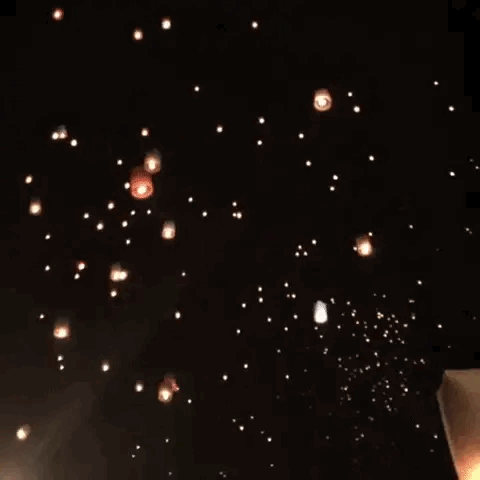
东风夜放花千树,更吹落、星如雨。
The streets are lighted with vibrant lanterns, like thousand of trees filled with many flowers. Fireworks light up the air, and they fall like a rain of stars.
宝马雕车香满路。凤箫声动,玉壶光转,一夜鱼龙舞。
Luxurious horse drawn carriage and fragrant perfumes permeate the street. The Fengxiao (reed flute) plays, the jade pot swirls; it is a night that’s as lively as the sea
T/N: the 玉壶 Jade Pot is a common symbolism in ancient poetry. It usually represents someone with a flawless and pure heart; someone who is honest and indifferent to fame and fortune. Sometimes, it also refers to the radiant moon. In this case, some translations have translated this to the pot, and others the moon. And I love the juxtaposition between the 凤 Phoenix and the 龙 Dragon. 😍 鱼龙舞 does mean a lively scene, but if you break the words down, it means the dance of the dragon and fish, which I think is a beautiful imagery.
蛾儿雪柳黄金缕,笑语盈盈暗香去。
With moths, winter willow and gold threads in their hair, the ladies laugh and their fragrance drift by.
A 蛾儿 (moth), 雪柳 (winter willow) were hair accessories that women would adorn in ancient times during the Chinese Lantern Festival.
众里寻他千百度,蓦然回首,那人却在,灯火阑珊处
I search for her thousands of times in the crowd. And when I turn back suddenly, she’s right there under the glow of the faint lantern light.
7 notes
·
View notes
Text
2023.08.11 意識が宇宙の果てと繋がってしまわないために
8月4日の日記(エッセイ)はこっちにあります 2023.08.04 感情、誘蛾灯、たとえばマクドナルドへの逃走
*** 夏になってからずっと精神は悪いけれど、特��8月7日の夜辺りから、特に精神が悪くなった。そして、体調も悪くなった。夏だから、あまりにも外が暑いから、夏バテしている、というのもあるだろうし、ずっと徹夜と仮眠を繰り返していたから自律神経が狂ったというのもきっとある。普段から、精神がよい、という状態は稀で、地面に空いている深い穴を避けるようにして歩いているわけだけど、体調が悪くなったり自律神経が狂ったりすると、その避けているはずの穴に落ちやすくなるのかもしれない。 ほんとうに、ものを食べることができなくなっていた。コンサータの影響があるにしても、以前まではそれでももう少しは食べれていたので、コンサータとかは関係なく、とにかく食欲がなかった。作業のようにして食べる。8月に入る前くらいには一瞬、調子がいい時期があったけれど、まったく持続しなかった。
***
何日か前の夜、(全然診断とかはされていない。でも、近い言葉を選ぶのなら)パニック発作ぎみで、どうしようもなくて家の中をウロウロしていた。あの状態に入ると、ほんとうにどうしようもなくなる。世界の質感が変わる、別の世界に来たみたいだと感じる。胸がずっと(精神的に、だけど物理的でもあるような仕方で)圧迫されていて息が吹いづらくなって、深呼吸をする。強い不安。現実感が失われる感じ。 具体的な生活の不安もあるけれど、それはやがてもっと曖昧なものへの不安になる。毎日がずっと続いていくこと、続いていくこと、眠ること、すべてが怖いし、これまで数千回も、どうやって夜を越えてきたのだろう、と思う。生きていくことは怖いけれど、死ぬことも同様にして怖くなる。とにかく、意識が対象を失うと、宇宙の一番遠くの方にある巨大な無に精神が繋がってしまうから、それを防ぐためにYoutubeで適当な動画を見る。ゲーム実況を見る。Youtubeの動画で精神に蓋をして、宇宙の果てと意識が繋がってしまわないようにする。でも、Youtubeを「見る」といっても、最近は見るのがしんどいので、目をつむって、黒いイヤホンをつなげて動画を「聞いて」いる。だから、いつしか映像が中心というよりかは、演者のトークが中心の動画ばかりを探すようになっていた。 ***
いまは比較的落ち着いているから、「そんなこともあったな」と数日前のことを振り返ることができるけれど、それと直面しているその瞬間には、その状態が、その世界が一生続いていくかもしれない��という予感ばかりがある。 逃走計画を考える。私たちを追ってくるすべてのものからの。
幼い頃、インフルエンザで高熱を出した時に、世界中すべての場所から馬のような何かが自分のいる場所までやってきて攻撃をする夢を見たから、はやくここから逃げないといけない、と思って、家の中にある大切そうなものをすべてカゴの中に入れて、「はやく逃げないと」と訴えかけて家から逃げようとしていたことがあって、時々、それに近い精神状態になる。どこへ逃げるのかを知らないまま。
(1244文字)
2 notes
·
View notes
Text
青玉案·元夕- Green Jadeite Platter · Fifteenth Day of New Year
by 辛弃疾 (Xin Qiji, 1140 to 1207)
东风夜放花千树, dōngfēng yè fàng huā qiān shù, In the East wind, night sets blossoms on a thousand trees,
更吹落、星如雨。 gèng chuī luò, xīng rú yǔ and blown down, stars fall like rain.
宝马雕车香满路。 bǎo mǎ diāo chē xiāng mǎn lù Fine horses, exquisite carriages, fragrance suffuses the road in their wake.
凤箫声动,玉壶光转, fèng xiāo shēng dòng, yù hú guāng zhuǎn The phoenix-flute’s moving melody, the jade-pot’s arcing light;
一夜鱼龙舞。 yī yè yú lóng wǔ lanterns of fish and dragons dance through the night.
蛾儿雪柳黄金缕, É er xuě liǔ huáng jīn lǚ Little moths, snow willow and tassels of gold,
笑语盈盈暗香去。 xiàoyǔ yíng yíng àn xiāng qù. laughter, chatter, bright and clear, indistinct scents fading as they go.
众里寻他千百度, zhòng lǐ xún tā qiān bǎi dù, In the crowd, a hundred, a thousand times, I searched;
蓦然回首, mò rán huí shǒu, suddenly turning round -
那人却在,灯火阑珊处。 nà rén què zài, dēng huǒ lán shān chù but there - that person stands where the lights are dimming.
………………………………………………………………..
Notes
// First, a note: Super glad @liberty-or-death also feel in love with this poem (translated here) which has inspired so many others out there, be it songwriters, authors or poets with its romantic atmosphere <3 Open invitation to share your take on this one too! There are so many ways to interpret it.
Aaaaaaaand we’re at the last day of Chinese New Year! \o/
08-Feb-23 Edit: I spent so much time looking things up for ‘one last word’ that it is no longer the last day of new year LOL. OOPS. So typical... xD
This time with a poem also about this time of the year with some lovely and vivid descriptions of how it was celebrated. I actually translated it in 2021 for a poetry sharing group read, and shelved it afterwards because I wasn't quite into it enough to write the usual comments. This time, I found the energy, because GUESS WHAT? Xin Qiji and Lu You (dude from the last poem about the first day of spring and the new year, my fellow cat lover) knew each other!
I was racking my brains trying to remember why Xin Qiji was such a familiar name when I came across it on Lu You’s baidu page LOL.
It’s not relevant to the poem, but do allow me to sidetrack a little on this.
Xin Qiji and Lu You were contemporaries of what we now call Southern Song. Xin Qiji was the younger between them by fifteen years; Lu You lived from 1125 to 1210, while Xin Qiji was born in 1140 and passed in 1207.
Xin Qiji was born in a territory that had been overtaken by Jin, his grandfather was unable to follow the Song in its retreat - for family reasons - and ended up working in the Jin court. [There’s background that I’m not including in here because it was shocking to read it again. You can google Jiankang Incident if you're curious, but I wouldn’t recommend it!]
As his father died early, Xin Qiji was raised by his grandfather whose influence had him growing up to be a patriotic and upright man, eager to restore the central plains and avenge the suffering of his people and country.
At the age of twenty one, he joined the insurrection against the Jin. There, he proved himself a skilled leader, earning a place in the Song Court with military merits. With the Emperor’s interest in restoring lost land, Xin Qiji and those of the faction which supported war against the Jin were given what they wanted at last and even won a series of victories. Unfortunately this was stopped in its tracks by a defeat due to infighting amongst the leaders of that campaign.
After that, the faction which supported peace via appeasement gained the emperor’s favour and Xin Qiji’s alignment with the side for war meant his proposals to this end went ignored. However, the court was impressed by his capability and frequently promoted him. This did not satisfy Xin Qiji though, and his identity as a returner from the Jins was a barrier to further advancement in his career. Anyway, he was eventually fired for ‘extravagant spending and wanton killing and other crimes’ when his work in the areas he oversaw began to encroach on the interests of the nobles and the wealthy people there. By this time, at the age of 40, he had realised his forthright nature was not earning him any points in politics and had made preparations to go into seclusion. He settled in Shangrao, northeast of Jiangxi province.
Between 1188 and 1203, he returned to take on some positions, got censured again, had more adventures and enjoyed the retirement life some more (especially in 1196! we might touch on this time in the future).
In 1203, he was brought on board again into politics as one of the people who believed war was the path to take. At the age of sixty four, Xin Qiji was made governor of two prefectures, Shaoxing 绍兴府 and Zhedong 浙东, simultaneously. It was during this time that he met Lu You, who had retired to his hometown of Shanyin. (Shanyin 山阴 and Huiji 会稽 Counties fell under the governance of Shaoxing Prefecture).
Shaoxing Prefecture 绍兴府, underlined in red.

(Source)
Shanyin 山阴, underlined in red.
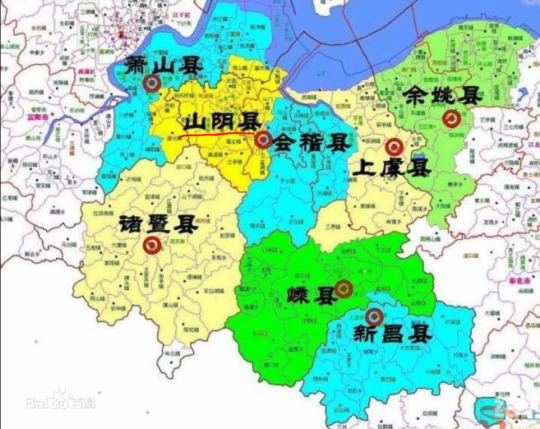
(Source)
And just something that makes me smile from google maps: A Shanyin 山阴 road in modern day Shaoxing 绍兴!
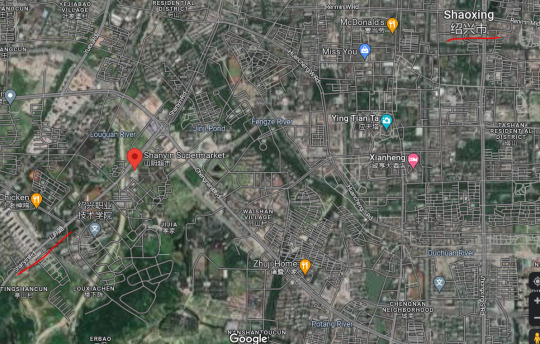
(Source)
And of course these two patriotic people would hit it off. Their acquaintance can be verified via Lu You’s poem 《���堂》 and his commentary. When Xin Qiji was summoned back to court in 1204 for an audience with the emperor, Lu You sent him off with a poem 《送辛幼安殿撰造朝》that was full of praise and encouragement.
Xin Qiji was made governor of Zhenjiang fu, a small official’s position elevated with the bestowment of a gold belt, but it was just behind the frontlines of the Jin-Song fighting at Yangzhou. That’s probably the closest he ever got to the action (and he knew it too).
Background
Unlike the one with Lu You where he so conveniently stated the year for us, it’s not possible to tell when Xin Qiji wrote this poem. Only that it describes a 元夕 (yuán xī), as they call fifteenth day of the first month. The name of lantern festival lit. 灯节 (dēng jié) only became popular from Qing Dynasty onwards.
But no matter the exact time this was written, I think it’s interesting to keep Xin Qiji’s life and his character in mind as we read his work!
Format and Title
This is a Song Dynasty lyric to the tune of 《青玉案》, or Green Jadeite Platter, with the 元夕 there telling us the time of year.
Poem
Sight
I’m reading the first line as 东风 / 夜放 / 花千树 [the East Wind blows] [in the night, placed] [flowers in a thousand trees] where 放 (fàng) is interpreted as ‘set (down)’ or ‘placed’ rather than ‘blossoms’. Reading as the latter, you can also understand it as ‘the wind from the East blows, and in the night a thousand trees blossom’. It’s not literally the East wind or the night that causes actual flowers to blossom. The East wind serves as a time marker and setting; in Spring which the new year begins in during Xin Qiji’s time, the wind from the east is relatively warm and melts the frost of Winter. As a traditional part of the Lantern Festival, Lanterns are hung in the trees. That’s why you can see them ‘blooming’ in the night. There, they are like glowing flowers. It may not even be trees! Maybe there are so many of them hanging that it feels like a forest. This is a visual description, all the more vivid for its metaphors.
The next line 星如雨, could be drizzling raindrops refracting light or sparks of fireworks from the sky. Fireworks were fully developed in the Song Dynasty, and there are even records of them being used in the time of Emperor Huizong of Song (1110) and Emperor Xiaozong of Song (1183), so either reading makes sense!
Smell
Why is there 香满路 fragrance permeating the street? Because carriages were perfumed with incense - not just carriages of course, but also the people sitting in them because the incense culture was just such a part of everyday life. They used these devices called Scent Balls 香球 to scent their clothing, their carriage or even a room. Only nobles or the wealthy could afford to use these at the time.

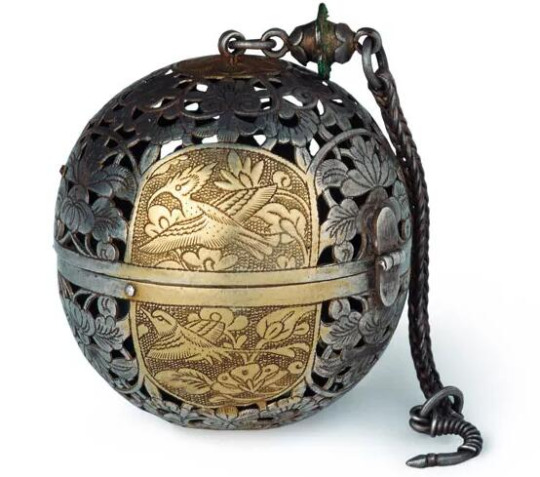
(Source)
Sound
The ‘phoenix flute’ 凤箫, referred to the panpipe, and was a prettier name for it - like comparing its melody to the trill of a phoenix. This is not necessarily saying that there is only the music from panpipes there that night, but could also be a fancy way of saying good music!
The phoenix flute 凤箫 panpipe (though that’s a dragon xD).

(source)
Jade-pot (玉壶), could be referring to the moon for obvious reasons…
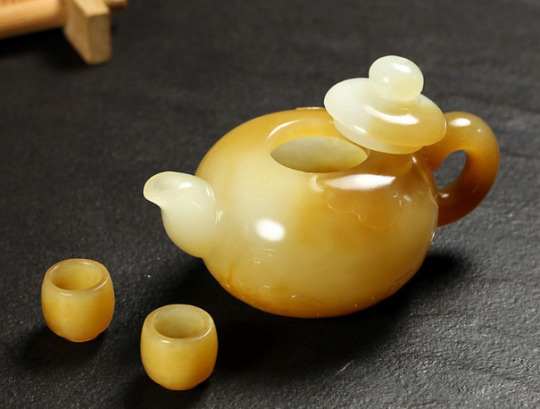
(Source)
It could also be another lantern!
And so I read 光转 as the movement of its light over people and things. It it’s the moon, maybe even the passage of time throughout the night… which then leads me to the last sentence of this half of the lyric.

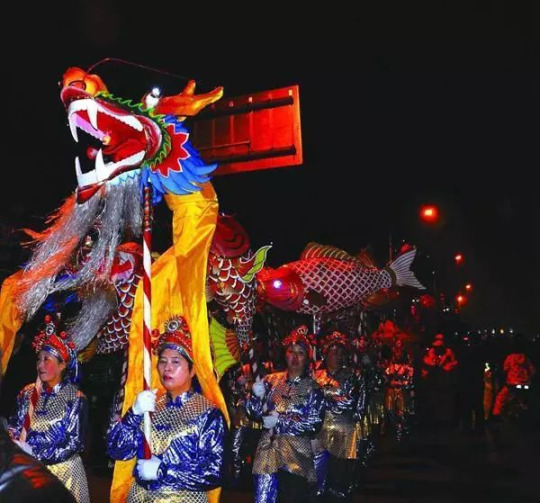
(Source)
Imagery & Time
It’s a very festive image. You can almost see the parade of the dragon and its fish under the light of the lanterns, and the crowd following along to see! This is a traditional part of Chinese New Year even now and I am delighted to know it was that way in the past as well.
Sights, Sounds, Smells
Now for the little moths, snow willow and tassels of gold. These are all seasonal accessories. To be exact, they refer to women’s hairpins. Where can these possibly be on the night of a New Year’s afterparty? On ladies’ heads of course!
This is a very cool post on clothing and traditions in the Lantern Festival. The title specifies the scope to be Ming and Qing, but there also also mentions of things that stretch further back. For example, ladies wearing 闹蛾 (playful moth) which is in the poem, is mentioned near the bottom of the post.
Here is a snip from 《簪花仕女图》Court Ladies Adorning Their Hair with Flowers, supposedly by Zhou Fang of Tang Dynasty.

(source)
Laughter 笑 (xiào) and conversation 语 (yǔ) are heard. The word 盈盈 (yíng yíng) or clear/beautiful describes these voices, and the faint, indistinct fragrance (as mentioned before, wearing scent balls was a popular practice, like perfume these days) that came with them gradually fade as they walk further away.
Space is limited in lyric and poetry, so a poet must be very sharp and apt in his choice of words, and wow has he done a good job! The first part of this lyric painted the backdrop of a festive night filled with luxury and beautiful things. Though metaphors, dare I say, to the point of exaggeration have made this picture vibrant and charming. What a lovely place to be!
The third sentence 蛾儿雪柳黄金缕 |Little moths, snow willow and tassels of gold, 笑语盈盈暗香去 | laughter, chatter, bright and clear, indistinct scents fading as they go. brings all the senses together, while drawing attention to ‘people’. The previous descriptions were all very indirect; lanterns they’ve put up, fireworks set off and observed, vehicles, music created under the light of the moon or lamps, and the dances. This feels like a zoom-in and building up of the already established lively atmosphere, the chattering young lady/ladies walking past brings a touch of life.
But just as quickly as they entered, they fade into the distance. And here is where there is a sudden change in tone. If this were a song, I’d call it the beat drop. We thought he’d been admiring and enjoying the night. Perhaps he is… but there was another important purpose to all this keen observation - a search for that one person in the crowd. Doesn’t this revelation cause an interesting shift in your perception of all that came before this? It did for me!
He’s looked and looked and looked to no avail. And maybe his sixth sense tingled, maybe it was happy coincidence, but after so much seeking, it turns out this person wasn’t with the crowd and the lanterns. They’d been behind him all along, and unlike the rest - standing where the lights were dim, in a quiet (perhaps run-down) corner.
Since the ‘beat drop’, there has been a relaxation of the pace. The poet lifted his foot from the accelerator for sensory input and extravagant descriptions, so it feels like I’m inhabiting this little moment, this island of peace, relief and touched delight. That feeling of simplicity and that someone I’d been longing to see without much hope, is There, reciprocates and had (maybe) been waiting for me too.
It was a beautiful night, but now it is a beautiful night.
………………………………………………………………..
I have such fondness for a passionate and sharply competent Xin Qiji with soft feelings for this world. His enjoyment of joyous celebration - and hey it may be a little opulent xD but these are his people and them being able to make music and dance through the night is something worth fighting for.
#青玉案·元夕#辛弃疾#this is a suuuuper beautiful poem#it's also super different from his usual style#or so i hear#commentary
30 notes
·
View notes
Text

猫の言い分に勝るものはない
人間の都合より彼らの主張、そこにはそこはかとなく展開される流儀があるようだ。
改造プロジェクトに関しては後日書こうと思うが、初めての猫を迎えるにあたって多くの知り合いや獣医さんにいろいろとアドバイスを頂いた。その結果、猫は横運動だけではなく、縦の運動も必要だと教えてもらった。ゆえに、居間に続いている使っていない和室を改造して洋間にした後で、猫の為の縦運動場を作る算段に至った。
窓は和���のままだが障子分の幅があり、猫が日がな一日過ごしても寝る幅が十分あるため、格好のニャルソック場所になっている。もう一つの大きい窓には雪見障子があるため、冬の日向ぼっこには打って付けの場所だ。
そして、今回の『猫の言い分(主張)』と称される理由がこの窓にある。和室の電気は蛍光灯のため、夕方になると虫が寄って来てしまうのだ。真冬の時期ならいざ知らず、春の今の時期は私の苦手な羽のついた蛾やら小さな虫が飛んでくる。そのため、西日が少し落ち着いてきた時間になると、雨戸を閉めてしまうのだ。
にゃんで閉めるニャ!
まだ明るいうちに閉めると、居間から和室までを縦横無尽に走って来た彼女がニャ~と窓の前で一鳴きする。ブログを書きながら『ごめんね』と謝ると、じっと見つめてから窓枠の部分に飛び乗って見えない筈の外を見つめる。
「・・・・・雨戸閉めているから見えないって言いたいのか。」
雨戸の閉まったガラスを見つめ続ける彼女の主張。意地らしい彼女の主張に根負けして、雨戸を少しだけ開けて、外が見えるようにする。
「にゃぁ~ぁ~」
明るいうちから閉めないでニャ!
まるで抗議するかのように主張する彼女は、満足したかのようにそこに座り込んで外を見ている。今日も根負けしてしまった。
この攻防に終わりは来ないだろう。温かくなって日が長くなったのだから、ここは知恵を振り絞って人間が折れるしかない。虫が寄ってこないように、彼女の気持ちを優先させるためにも、遮光カーテンの設置をしようと思う。
こちらの記事は下記サイトで掲載しています。Tumblr登録前の過去記事はプログラムの余分設定で自動共有できなかったので、愛猫の話だけ載せています。
2 notes
·
View notes
Text
为什么小女生总是老男人嘴边的猎物

大体讲来,女人的身子是跟着心灵走,男人只要嬴得她的芳心,就能抱得美人归。而男人的身体与心灵有时并不同步,甚至身体与心灵完全处于相反的方向,这种身心完全分离的男人,通常是人们口诛笔伐的"渣男"。所以女人在情感上要比男人付出更多的心血,更大的代价,但是辛苦"耕稼",未必都会是"一份耕耘,一份收获。"颗粒无收的感情比比皆是。
然而大多数恋爱中的小女生对爱情都带有梦幻的色彩,幻想着能嫁个外表峻朗,幽默有钱,又言听计从的如意郎君,不过能有如此幸运的女人并不多见,像马依俐这么厉害的角色,在婚姻上也未能如愿以偿,所以对于大多数择偶的小女生来说,降低对男人的期望值看来很有必要。
曾经读到一篇文章,它的标题是《男人的沧桑,更能触动女人的灵魂》,问题在这"沧桑"二字如何诠释,如果把男人脸上横七竖八的皱纹,一副故作深沉的模样,一段讳莫如深的经历称之为沧桑,恐怕会让很多小女生失望。那些涉世未深的女孩子总是喜欢梦想,尤其是自己一见倾心的爱情,在她们眼中都充满了玫瑰浪漫的色彩,并投以朝圣的目光和全部的幻想。在她们眼中,男人脸上的一道道皱纹会绽放出深沉的光芒。那副故作深沉的外表,与高仓健何其的相像,简直就是稳重内敛的代名词。那些添油加醋的坎坷的经历,好像不早不晚,正静静地等待着你这个小女生义无反顾,赴汤蹈火来抚慰,来拯救。然而激情过后,受了伤的小女生却赫然发现自己才是个自欺欺人的大傻瓜。
男人的"沧桑"最后伤到小女生的爱情,在现实生活中并不少见。几年前,我曾听过一段朋友的亲身经历。这对华人夫妇开了一个小餐馆,夫妇俩每天都要忙到临近午夜才能回家,工作忙碌辛苦。他们膝下有个宝贝女儿,来澳洲多年,也长得婷婷玉立。女儿中学毕业后,上了大学。在大学读书期间,小女生总喜欢泡在图书馆里自修,直到掌灯时分才离开。回家除了坐公共交通之外,还有一段近二十分钟的步行路程,小女生的父母亲对车站周边的治安状��很担心,于是委托他的朋友每天负责把自己的女儿从车站接回家。这位朋友过去是女儿父亲的大学同学,也算是知根知底好友,他的妻子来到澳洲之后,便与他草草的离异,个中的原因并不为外人所知,虽然后来他也结识过几个女友,但交往时间都不长。过了差不多半年,终于有一天,他女儿告诉父母,她准备与她父亲年龄相仿的老男人另觅新居,准备同居。这个消息对她父母无疑是个巨大的打击。后来这段关系没有维持多久,小女孩又搬回到父母身边,至于究竟发生了什么事情,我不敢妄加揣测,不过后来再见到这个女孩子时,完全是一副神情落寞,郁郁寡欢的样子,看得出来这段经历让她备受痛苦和煎熬。很多时候小女生还没明白是怎么回事时,就已经成了老男人口中的猎物,看来男人的"沧桑感"确实具有很大的杀伤力,不仅如此,很多老男人还都是情场的老手,所以在这场力量悬殊的交手中,小女生往往都是第一个先败下阵来。

如果一个男人"沧桑"的外表,其背后是一种深沉的,经历过岁月沉淀的成熟的感情,那是不是意味着这是可以托付终身的爱情?其实这也很难说。旧时男人一旦有了社会地位,有了富足的财富,首先想到的是三房四妾,这种观念并未随时代的进步而有多少改变,有时还更加的变本加厉。所以小女生成为老男人口中的猎物这种事情,在我们当今社会中并不少见。前几个月,中科院院士,北京理工大学副校长方岱宁网络会议上被年轻女子亲吻的视频,闹得沸沸扬扬,最后学校不得不免去方岱宁的校学术委员会主任、校务委员会副主任职务,停止其研究生招生资格。在这场风波里,一个是64岁老男人,一个才34岁的年轻美女;一个是手握权力的导师,一个是他的学生;一个是服了"春药"的老男人,一个是投怀送抱的小女生;一个在镜头前巴巴相送,一个端坐着欣然接受,两人在这场爱情中的位置一目了然。
男人与女人的爱从来是不平等的,男人对女人的怜悯是近乎于爱,而怜悯往往来得快,去得也快。女人对男人的爱却带有崇拜性的,爱到极致可以飞蛾扑火,赴汤蹈火。这让那些老谋深算的老男人暗中窃喜,于是在一副沧桑的外表下,穿上华丽的权力和财富的外衣,外加一只甜言蜜语的"不烂之舌",一个油头粉面,穿着入时的老男人便开始登堂入室,而且指哪打哪,无往而不胜,是不是这些老男人有特别的魔法,特别有能耐?我看并不见得。让这些小女生深陷其中而不能自拔的,往往是她们自己,因为当感情投入进去之后,她们压根就不想自拔。
这篇《男人的沧桑,更能触动女人的灵魂》文章里有这样一段文字颇为有趣:"男人的沧桑,如同一本耐人寻味的书,可以让女人不厌其烦地去阅读,如果这个男人有内涵又沧桑,形象也过得去,还有基本的经济基础和沉稳的内心世界,那真是女人们梦寐以求的夫婿。"我的天哪!这种梦寐以求是不是太天真了。首先这样的单身老男人并不多见,更何况,老男人这本书怎么会能让你们小女生轻易读懂的。所以小女生读了一半,似懂非懂,便心急火燎一头栽进这场爱情博弈中,其结果一定是摔个鼻青眼肿。或许有人会说,这本书读多了,读久了,自然会无师自通,运用自如,此话似乎也有几分道理,但是,这需要与老男人真正过过招才行,当然你还得付出很多的情感,最后脱一层皮也不见得一定能修成正果。其实与其在老男人身上蹉跎自己的花季岁月,倒不如找一个燃点相同的男人,让二人之间爱情火焰在岁月的长河中共同燃烧,或者找一个双方都合得来的,在情感,经历,年龄上都"门当户对"的男人,双方即容易相互沟通,相互理解,又能彼此包容,彼此妥协。再退一步,干脆找个自己并不觉得怦然心动,却又能拿捏自如的男人,这样反而生活得轻松自在。

张爱玲曾说过,女人比男人较富于择偶的常识。看看她后来的二段婚姻,你会发现连张爱玲这样的才女,对男人的了解也仅仅停留在笔和纸上。其实张爱玲骨子里就是不谙世事的小女生。在她第一段的婚姻里,一个是以文字为职业的23岁姑娘,一个是有妻有妾的38岁的老男人,地地道道的情场老手,在上海爱丁顿公寓里擦出爱情的火花,演绎出一段传奇之恋,结婚誓言上的"岁月静好,现世安稳"墨迹未干,这个老男人又相中17岁的女护士,并与她同居,之后老男人又接连外遇。最后精疲力尽的张爱玲还倒贴了30万,作为老男人的青春补偿费,让这场前世今生的爱情,添加上千疮百孔的注角。张爱玲来到美国后不久,又开始另外一段异国恋情,一个是情伤累累的35岁的中国女人,一个是如父亲般穷困潦倒的65岁美国老男人赖雅,他们在麦克道威尓文艺营结识之后,命运之神将他们栓在一起。结婚不久,赖雅多次中风,张爱玲开始一心一意担负起照顾病人的角色,在赖雅将她折磨够了撒手人寰之后,这场异国之恋便戛然而止,真是造化弄人。所以满身伤痕的张爱玲无比感慨的说:"生于这世上,没有一样感情不是千疮百孔的,所谓的唯美只存在于剧情里。因为不唯美,我们才会去苦苦追寻;因为不唯美,让我们知道还有一种东西叫做希望。"这些话前半段近于愤世嫉俗,但从张爱玲苦苦追寻希望的过程来看,让人有一种说不出的感慨。
当然生活中也不乏有和美的���少伉俪,好男人也到处都有,可惜很多都已经入了婚姻的"围城",散落在城外的好男人个个成了炙手可热的的人物。不过小女生也无需打着灯笼到处去寻觅好男人,爱情更多讲的是缘份"有缘千里来相会,无缘对面不相逢",缘份来了,就得好好珍惜,千万不要让它从指缝间溜走。对这种陈词烂调,许多着了迷的小女生并不买帐,她们依然向往着《追捕》、《远山在呼唤》里高仓健那完美老男神的形象,个子高大,平顶短发,穿着风衣,一副神情冷峻,沉默寡言的样子,像这样的"男子汉"形象早已深入少女们的心灵。然而在她们眼中,现实世界尽是些大腹便便的官员、商人,孱弱的书生,油嘴滑舌的市井混混,老实木讷的宅男,唯独缺少像高仓健这般的"硬汉"。一旦她们认识到所谓的"硬汉"只存在于自己的梦境中这个道理,却蓦然发现自己早过了美丽的青春年华。
我总以为两情相悦,牵手一生固然令人羡慕,其实爱一个你能接受,而又深爱你的男人,也是一段美丽的爱情佳话,因为但凡男人心中有爱,他人性中最美的一面,一定会对你徐徐的展现,让你时不时的沉浸在如沐春风的感觉里,而那些迷恋所谓"男人的沧桑"这种神话的,最后留给自己的是一段段苍凉的记忆。
youtube
3 notes
·
View notes
Text
乗降場
murashit
ときおり、あの夜の記憶がよみがえってくる。
夜風にコートの前をかきあわせたわたしは駅のホームに立っていて、残業の帰りだか飲み会の帰りだかも判然としないけれど、ずいぶんと遅い時間ではあるようだった。もうひとまわり厚手のストッキングにしておくべきだった。酒の入った気分でもないから前者と覚えるものの、あるいは後者で酒気を冷まされただけかもしれない。
高架に乗った小綺麗なホームを見るに、私鉄、郊外、そういった立地らしく、遠目の先には街灯がぽつぽつとしている。ときおりのクラクション。駅名表示の看板も時刻表もみあたらず、そこの階段を下りればなにかわかることもあろうかと思った。けれどどうにも億劫だ。このように憮然と立ちつくしているからには、きっとやってくる電車に乗るだけなのだ。
菱川と別れた日を思い出す。葬儀場はおなじような私鉄沿線にあった。終えて、そのまま帰る気にもならず、駅前に見つけたバーでぐずぐずし、遅くなってからこんなふうに電車を待ったのだった。菱川がまとわりついていたような心地がしていた。この夜より前のことだったろうか、それともあとのことだったろうか。あるいは当夜まさにその菱川と会っていたのかもしれない。
かつかつと固い音が響いたと思ったら、女がひとり階段をのぼってきた。階段に見えたときからむこうに立ちどまるまで、いやそれからもずっと、スマートフォンをぽちぽちとしている。階段を挟んで反対側のわたしからは顔も見えないが、うしろ姿から判ずるに若い女のようだった。こちらには気づいていないらしい。ふと、ここはどこかと尋ねようと思いつく。けれど、見知らぬ人間にとつぜん話しかけられても迷惑だろう。そもそも電車を待ちながら、ここはどこかもないものだ。そう考えてやめにした。
ふたたびしばらくの無音ののち、左のむこうのその遠くから、電車のうなりが届く。ちかづいてきたそれは、減速する様子もなさそうだった。つまり急行だか特急だかで、ここはその通過駅なのだろう。ヘッドライトのまぶしさにおもてを下げているうち、強い風とごうごうという音で、車体が流れてゆくのがわかる。むこうの線路を走っていたから、わたしの目当てはきっと右側から来るのだと思った。通りすぎたのを見はからって顔を上げ、その方向をちらと見やった。
先ほどそこらにいたはずの女が消えていた。
怖気の立った気がした。女の消えたことにおののいたのか。けれど、考えてみればたいした話でもない。気づかぬうちに、電車の通りすぎるうちに、また階段を下りたに違いなかった。トイレに行ったとか、そんなところだろう。階段を照らす蛍光灯に群がる蛾たちを眺めつつ、わたしはそう思った。
実際、しばらくして女は戻ってきた。あいかわらずスマートフォンをぽちぽちとしている。たいしたことでもなかったはずだが、それでも心細かったのだろう、どこかほっとした心地がした。どころか、さらに高じてむやみに気持ちが大きくなってしまったらしい。わたしは女に話しかけてみようと思った。女はまだスマートフォンに夢中で、きっとわたしに気づいてはいない。ゆっくりと近付き、警戒されないよう、にこやかな笑みを忘れないように。しぜん後ろか��声をかける形になるのはしかたがない。次の電車はいつごろ来るんでしょうか、とでも尋ねるのだ。
すみません、と発したわたしの声に、しかし女が気づく様子もない。イヤホンでもしているのだろうか。いや、そういうわけでもなさそうだ。仕方がない、まさかのっぺらぼうでもあるまいと、わざわざそんなことを考えつつ、スマートフォンにむいた女の顔を覗き込んだ。
そのとおり、のっぺらぼうではなかったけれど、 女の視線は動かぬままで、こんなに近くにいるわたしに気がつかない様子である。手を振ってみる、ふたたび声をあげる。けれどやっぱり気づかない。肩をゆさぶってやろうか。さすがにそれはまずかろう。
女にまとわりつくようななりで逡巡するうち、電車のうなりがまた届く。さきほどと逆方向であるからして、わたしと女の乗るべき電車に思われた。だんだん減速している様子だった。わざわざ尋ねる必要もなくなったわけだ。ぼんやりとしたアナウンスの聞こえる気がした。降車すべき駅はいまだ思い出せなかったけれど、乗ればなんとかなるのだろうと思った。わたしはまだ女の顔を覗きつづけていた。どこかで見覚えのある顔に思えてきたからだ。まじまじ見たところで、どうせ気づきやしないのだ。
停車し、わたしはいまだ女の顔を見つめ、女はいまだスマートフォンを見つめていた。ホームドアと電車のドアが同時に開く。わたしはようやく姿勢を戻した。こんな時間だというのに、車内はたくさんの人でひしめいていた。
そして、そこにいる全員が、わたしを見つめていた。ドアの向こうの人間たちも、窓ごしに見える人間たちも、そこにいる全員が、手前のものはわざわざ振り返ってまで、わたしのほうに顔を向けていた。目玉をこちらに向けていた。曖昧なアナウンスがして、ドアが閉まった。電車がすべりだす。後続する車両に浮かぶすべての目玉が、わたしを見つめていた。加速にともなって視線は曖昧になってゆく。動けなかったのだと、テールライトを見送りながら気がついた。女はあの電車に乗っていったらしかった。
それからわたしは、ずっとこのホームで電車を待っている。覗いた顔は、いまでは菱川の顔としてしか描けない。
3 notes
·
View notes
Text
rules: 🎧🎵 when you get this, you have to put in 5 songs you actually listen to at the moment. Then tag 5-10 followers to do the same 🎵🎧
ty for tagging me @uuuuutan 💖 i’m doing this based off my spotify on repeat playlist hjlsldgk
1) APOGEE - Midori (Sea Gazer is a great album in general but this song is Everything to me)
2) She Her Her Hers - non zero sum game (rly dreamy sounding song; i played it 10 times in a row when it came out which i pm never do w/ songs)
3) PREP - Turn the Music Up (idek why i like this so much but it’s subjectively good to me)
4) Miura Daichi (三浦大知) - Yuugatou (誘蛾灯) (knowing him, the choreo for this probably kicks ass. now is when i scream “stream kyuutai!!!” into my echo chamber)
5) Sara Wakui - Maze feat. Mimiko (kinda jazzy? and dramatic sounding. i love the vocals on this)
if anyone sees this consider yourself tagged!
1 note
·
View note
Text
各地句会報
花鳥誌 令和6年10月号

坊城俊樹選
栗林圭魚選 岡田順子選
………………………………………………………………
令和6年7月1日 花鳥さざれ会 坊城俊樹選 特選句
浜木綿を染めし落暉の日本海 かづを ナースとて香水ほのと香りたり 同 風に波打つまで育ちゐる青田 同 網戸越し松に鴉が羽繕ひ 清女 這ひ出でし苔を褥に夏の蝶 笑子 青梅雨の沖へ沖へと藍深む 同 産土の茅の輪くぐりに星が降り 希子 女達噂話や梅雨しとど 和子 虚子愛子柏翠句碑に大夕立 匠 蛍や自害に果てし一城主 雪
(順不同特選句のみ掲載) ………………………………………………………………
令和6年7月4日 うづら三日の月花鳥句会 坊城俊樹選 特選句
夏の雲飛行機雲に結ばれて 喜代子 狭庭にも大株四葩二本咲き 由季子 天筆に今年も祈る星祭 都 パナマ帽モボモガの世に生きた親 同 青すだれ隣家の灯り遠くなり 同 単衣着て白き衿足なまめける 同
(順不同特選句のみ掲載) ………………………………………………………………
令和6年7月6日 零の会 坊城俊樹選 特選句
梅雨の蝶なれば鼓動のやうな翅 順子 阿羅漢に逢ふには黒き麻を選り 同 蚊遣香きれいどころを紫に 光子 剥落の喜怒哀楽の貌涼し 風頭 金ピカの阿弥陀炎暑を撥ね返す 佑天 遅れ從く行人坂の上に夏 昌文 唇うすき五百羅漢の薄衣 同
岡田順子選 特選句
茄子植うる角を曲りて羅漢寺 和子 阿羅漢の肋へ夜々の早星 光子 女人描くやうに蚊遣の煙かな 和子 朝涼に羅漢千ほど詣でけり 軽象 羅漢へは夏の讃美歌届かざる 俊樹 水鉄砲水に沈めてゆく遊び 和子 汗の我汗無き五百羅漢像 緋路
(順不同特選句のみ掲載) ………………………………………………………………
令和6年7月6日 色鳥句会 坊城俊樹選 特選句
いそいそと出かける母の洗ひ髪 成子 原罪を忘れしごとく髪洗ふ 朝子 髪洗ひ沛然の夜を深眠り 美穂 身体の壺深くせむ泉湧く 同 蝙蝠となりイザベラの墓を守る かおり 無限とはあの夏雲のあふれやう 朝子 遠ざかる汽笛を胸に髪洗ふ かおり 待つ事に慣らされたかなソーダ水 修二 昼寝覚また見失ふ青い鳥 かおり いいかげんな返事はできぬ滝の前 睦子 地の底に坑道のあり夏薊 朝子 水海月ニュートリノとは身の不才 久美子 青く浮く水の惑星飛ぶ蛍 光子 群るること嫌ふ子の飼ふ目高かな たかし 手の中に捨つるつもりの落し文 美穂
(順不同特選句のみ掲載) ………………………………………………………………
令和6年7月8日 武生花鳥俳句会 坊城俊樹選 特選句
炎帝や新幹線の響動もせり 時江 汗の顔拭いても直ぐに汗の顔 みす枝 蛍の夜君と辿つた田舎道 和子 網戸より青き大空真清けし 時江 雲の峰向けて大きなホームラン みす枝 羅に齢見せたり隠したり 世詩明 万緑の中に抱かる風化仏 時江 弁解はすまじと白扇閉ぢらるる 昭子 老いたれば野盗の如く西瓜喰ぶ 世詩明 魂の抜けて極楽大昼寝 みす枝
(順不同特選句のみ掲載) ………………………………………………………………
令和6年7月8日 なかみち句会 栗林圭魚選 特選句
すこやかと母の昼寝のたのもしき 和魚 入道雲更に一段気負ひ立つ 秋尚 昼寝して疲れひと先づ剥がれゆく 貴薫 妣の忌や水やうかんの三姉妹 美貴 入道雲夢語り合ふ部活の子 同 保母泣かせ昼寝の時に元気な児 エイ子 海風に昼寝誘はれ母の膝 史空 束の間の午睡ゆらゆら旅の途中 のりこ 離れ島入道雲に呑み込まれ 史空 よく冷えて角立ちてをる水羊羹 三無 入道雲掴みきつたるクレーン車 同 今少し続きに未練昼寝覚 秋尚 定期船入道雲に溶けてゆく 史空 昼寝さめ穂高の風は空の色 ます江 幼子の昼寝絵本を抱きしまま 三無
(順不同特選句のみ掲載) ………………………………………………………………
令和6年7月12日 鳥取花鳥会 岡田順子選 特選句
断面のやうなビル窓夕焼けて 都 アイスコーヒー別れるために会ふ人の 同 火取虫灯りともせばあらあらし 和子 狛犬の口を漱ぐや男梅雨 美智子 さらばへて汗もかかずに老いてゆく 悦子 目の前の影と思へば蚊喰鳥 宇太郎
(順不同特選句のみ掲載) ………………………………………………………………
令和6年7月12日 さくら花鳥会 岡田順子選 特選句
非常なる毛虫退治も日常に あけみ きようだいが内緒の話ハンモック 裕子 今日を無事に終へて夜風と衣紋竿 同 山寺や山あぢさゐの道になり 令子 蛍飛ぶ幼き頃を誘ひ出し 光子
(順不同特選句のみ掲載) ………………………………………………………………
令和6年7月13日 枡形句会 栗林圭魚選 特選句
滴りに苔むす岩の息づかひ 多美女 凌霄花掴まり処なき揺れて 亜栄子 早苗饗やのんびり浸る露天風呂 幸風 解体の決まる旧家や釣忍 百合子 葛餅を分厚く切りて客迎へ 美枝子 葛餅のギヤマン盛の重さかな 文英 涼しげに楓日傘の年尾句碑 三無
(順不同特選句のみ掲載) ………………………………………………………………
令和6年7月16日 萩花鳥会
七月場所若手の力士続続と 祐子 雷神へ千の手拝む千年の樹 健雄 水田に波紋広げて梅雨に入る 俊文 今咲いた深夜の電話月下美人 恒雄 仙人掌の生きぬく力強きこと ゆかり 夕立の真つ只中の下枝かな 吉之 雷鳴に負けじ響くや母の声 明子 母逝きて幾年たちぬ仙人掌花 美恵子
………………………………………………………………
令和6年7月16日 伊藤柏翠記念館句会 坊城俊樹選 特選句
無雑作に立て掛てあり古葭著 雪 青葉木菟夜は淋しと鳴くならん 同 此のに金色飼はれし師の月日 同 足羽山はみだして来る蟬時雨 かづを 万緑を鎧ふ最古の天守閣 同 風鈴や此の先老をどう生きる 真喜栄 一と日毎老鶯の声啼細る 英美子 半百生鯖より蛸の足を買ふ 賢一 草を引く予定は未定なる気まま やす香 蛍の夜君と語りし田圃径 みす枝
(順不同特選句のみ掲載) ………………………………………………………………
令和6年7月17日 福井花鳥句会 坊城俊樹選 特選句
加賀鳶の夕顔の種翔しけり 世詩明 朝顔の晒したてなる朝の雨 同 梅雨の灯に手相見る癖ケセラセラ 清女 牽牛花の螺旋昇るや夢連れて 千加江 朝顔や父母ゐなく実家もなく 令子 夏のシャツざぶざぶ洗ふ達者に洗ふ 同 いとさびし師の忌が一つ増えた夏 淳子 雲の峰背ナに担ぎて手を振れり 和子 朝顔の咲いて嬉しきことも無く 同 荒梅雨や工事現場にヨイトマケ 数幸 光陰を渦に背負ひし蝸牛 雪 サングラス顔を隠してゐるつもり 同 光りたき所に光りゐる蛍 同 又の世も火蛾と生まれて灯を恋ふか 同
(順不同特選句のみ掲載) ………………………………………………………………
令和6年7月19日 さきたま花鳥句会
山百合や日に三本の村のバス 月惑 しなやかに見沼の青田穂を孕む 八草 翡翠を待つ三脚の影伸びて 裕章 はたと止む平家の里の夜の蟬 ふゆ子 梅雨明けて肌に塗るもの一つ増え としゑ 葉は枯るも生きてゐるよとミニトマト 恵美子 けだるげな猫の往診暑気中り みのり 酔芙蓉午後の日差しに色の濃く 彩香 愛想なき冷たさが好き竹婦人 良江
………………………………………………………………
令和6年7月21日 風月句会 坊城俊樹選 特選句
隠沼の何処に存すか牛蛙 文英 炎帝を弾きとばして母の塔 三無 雨上り烈日をあぶ蟬と吾 久子 夏の沼水切りの輪閃閃と 三無 みんみんの遠く近くに読経めく 慶月 琅玕の風をたわわにアッパッパ 幸風 隠沼を揺さぶる響き牛蛙 亜栄子 漢行く灼けし空缶蹴りとばし 三無
栗林圭魚選 特選句
ご褒美はお花畑の大饗宴 白陶 水無月の乾き切つたる空となる 秋尚 炎天の隠れやうなき径白き 同 父母と黴の匂ひや里の閨 経彦 沼いつも古色を湛へ蜻蛉生る 千種 石仏の錆びし錫杖金絲草 亜栄子
(順不同特選句のみ掲載) ………………………………………………………………
令和6年7月22日 鯖江花鳥句会 坊城俊樹選 特選句
金漿つけしお羽黒とんぼ登場す 雪 蝙蝠や国府の名残り路地���地に 同 真白なる羽根たたみたる火蛾の果て 同 夕方に雲の集まる男梅雨 たけし 宮涼し巫女の舞ふ袖ふくらめり 同 柿葺閂錆し竹落葉 同 蟬時雨一山丸ごと震へをり みす枝 ���逝きし庭より聞こゆ青葉木菟 同
(順不同特選句のみ掲載) ………………………………………………………………
0 notes